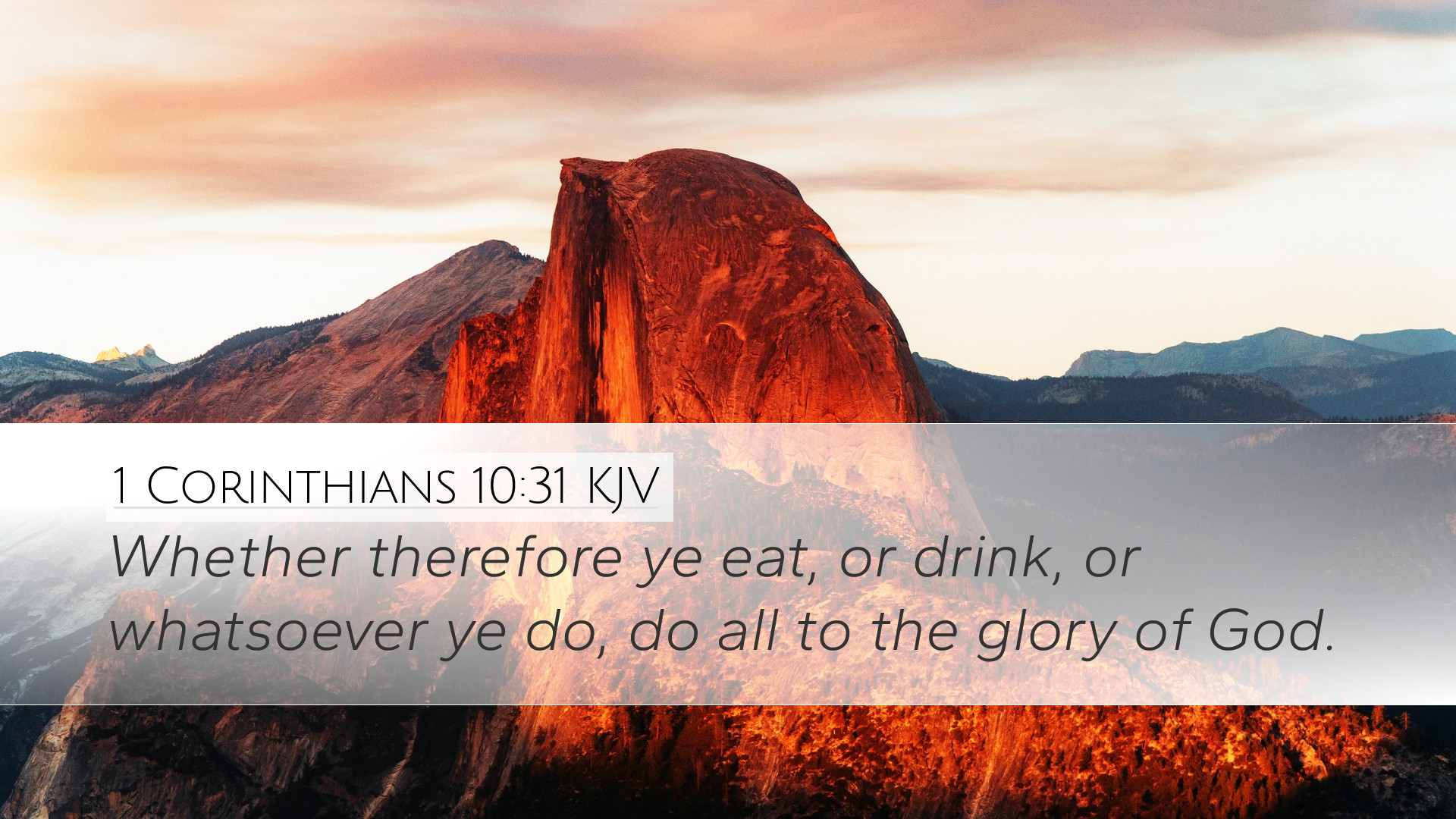Commentary on 1 Corinthians 10:31
Verse: 1 Corinthians 10:31 (ESV) - "So, whether you eat or drink, or whatever you do, do all to the glory of God."
Introduction
This verse encapsulates the essence of a Christian's life and duty—to glorify God in every action. The Apostle Paul, addressing the Corinthian church, emphasizes that all activities, even mundane ones like eating and drinking, must contribute to God's glory. This commentary synthesizes insights from Matthew Henry, Albert Barnes, and Adam Clarke, providing a comprehensive understanding for pastors, scholars, and students of theology.
Exegesis
The context of 1 Corinthians 10 is vital for understanding Paul's exhortation. The Corinthian believers faced issues concerning meat offered to idols and the exercise of their Christian liberty. Paul argues that actions should not be just permissible but should always aim to reflect God’s glory.
Matthew Henry's Perspective
Matthew Henry emphasizes that everything a believer does should be done with ultimate intent to glorify God. He remarks:
- Uniqueness of Christian Life: The Christian is called to a life distinguishable from the world, and all routines should be infused with spiritual meaning.
- Inclusivity of Actions: Henry points out the significance of even the simplest actions, such as eating and drinking, highlighting that no area of life is exempt from the call to glorify God.
- Intentionality: He stresses the need for intentionality in actions; believers should ask themselves whether their choices honor God.
Albert Barnes' Insights
Albert Barnes provides a pastoral interpretation that is practical and nuanced, noting that:
- Life's Dual Purpose: Barnes asserts that the verse conveys both a command and a principle that embraces every aspect of life. He posits that every task, be it spiritual or secular, may serve to glorify God.
- God's Sovereignty: He reflects that recognizing God's sovereignty in every situation—be it eating, drinking, work, or play—reinforces the believer’s commitment to a God-centered life.
- Witness to Others: Barnes highlights how a life lived for God's glory serves as a witness to others, thereby promoting the faith and attracting non-believers towards Christ.
Adam Clarke's Analysis
Adam Clarke takes a slightly more scholarly approach, expounding on the implications of glorifying God:
- Theological Ramifications: Clarke suggests that the imperative “do all to the glory of God” demands a lifestyle of holiness and purity that reflects God's nature.
- Moral Responsibility: He elucidates the moral responsibility of Christians, emphasizing that all actions have the potential to reflect either God's goodness or human folly.
- Ultimate Authority: Clarke insists that the believer's mindset should always align with divine objectives, thus making every act a conscious declaration of faith.
Application
In concluding their commentaries, each scholar provides vital applications for modern believers:
- This Directive is All-Encompassing: Every sphere of life—education, work, family, and leisure—needs to be viewed through the lens of glorifying God.
- Integrate Faith and Work: Practical application includes integrating faith into everyday life, demonstrating that spiritual disciplines inform daily activities.
- Evaluate Motivations: Believers are encouraged to regularly evaluate their motivations, ensuring that they align with the glory of God rather than personal gain.
- Community Considerations: Actions should also consider their impact on fellow believers and the broader community, fostering an environment that uplifts and encourages.
Conclusion
The command in 1 Corinthians 10:31 remains timeless, beckoning believers to live in such a way that every action is intentional in glorifying God. As Henry, Barnes, and Clarke elucidate, every detail of the Christian life—whether grand or mundane—should bear witness to God’s glory.


